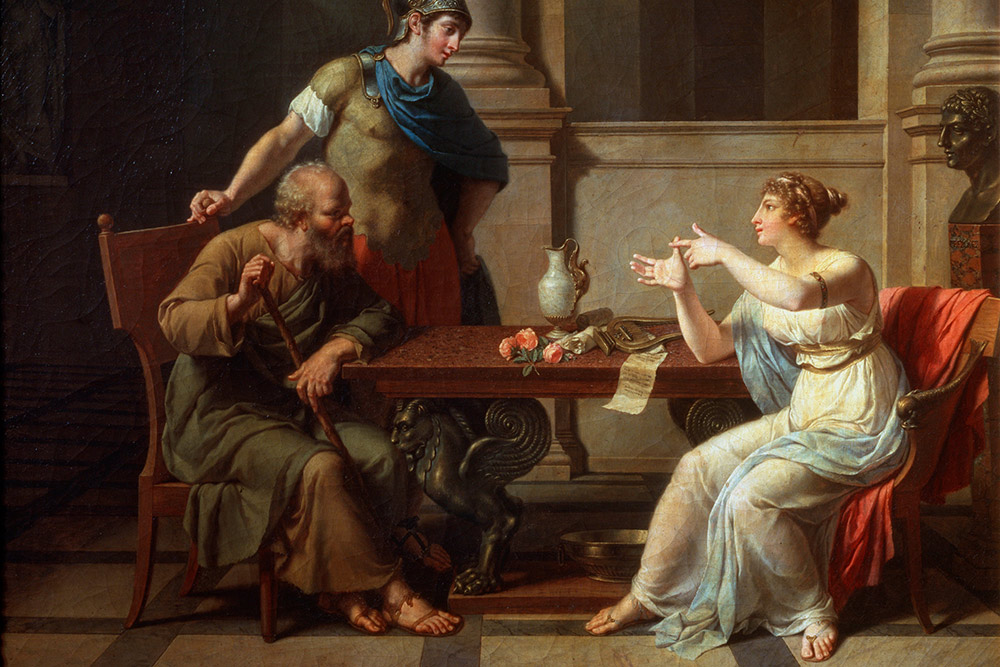
可以想見,當代商業(yè)領袖肯定沒空熬夜思考蘇格拉底的哲學。這實在可惜,其實蘇格拉底作為古雅典惹人討厭的家伙、西方哲學的守護神,以及第一位哲學殉道者,有很多理念可以應用于現(xiàn)代生活和商業(yè)。
用羅馬演說家西塞羅的話來說,蘇格拉底并不是第一位哲學家,但他是第一位“將哲學從天上召喚下來”的哲學家。蘇格拉底哲學偏實際,他主張與其關注生活的意義,不如多過有意義的生活。
當然能賺錢也不錯。蘇格拉底是石匠的兒子,最熟悉的是古雅典的集市。他精通商人的語言,與他交談的人大多是工匠和小企業(yè)主。蘇格拉底從來沒有寫過管理方面的書(真的一個字都沒寫過),但如果他要寫,應該會是以下這樣。
經(jīng)常保持疑惑
“所有哲學都從疑惑開始,”蘇格拉底說。商業(yè)企業(yè)也應如此。疑惑并非如藍眼眸或雀斑一樣天生,疑惑是種技能,人人都可學習。蘇格拉底認真介紹道。
我們常常把疑惑與好奇混為一談,其實兩者并不一樣。好奇是不耐煩的,總想追逐下一個突然出現(xiàn)的閃亮物體。疑惑則是能持續(xù)的,疑惑是好奇的依靠,是向上拔高,是勇敢之舉。
蘇格拉底會說,現(xiàn)代商業(yè)世界沒留下什么產生疑惑的空間。不管通過Zoom還是現(xiàn)場開會,收益報告和會議的壓力都沒留下讓人思考的空間,但思考才是真正實現(xiàn)突破的關鍵。史蒂夫·喬布斯就曾疑惑,如果把電話和便攜式電腦結合會怎樣,于是iPhone便誕生了。
慢慢來
疑惑需要時間。不管是豐盛的飯菜,還是全體員工會議,都不能操之過急。“當心繁忙生活中的貧瘠,”蘇格拉底說。他說話從不匆忙。即便其他人感到厭煩和憤怒,他也堅持慢慢來。同理,優(yōu)秀的領導者從不倉促地做出決定。他們不怕停頓。
停頓并非故障,更不是錯誤。正如蘇格拉底所想,停頓是孕育好創(chuàng)意的沃土。這就是為何優(yōu)秀管理者會鼓勵團隊有規(guī)律地且積極地停頓。
要解決“對的問題”
硅谷商界格外注重解決問題。蘇格拉底會說,很好,但有沒有正確地找出值得解決的問題?
如果提不出正確的問題,就無法解決問題。然而,“我們的文化通常傾向于沒經(jīng)歷問題之前就想解決問題,”舊金山州立大學哲學教授雅各布·尼德爾曼說。體驗問題意味著親自感受,而不是匆忙想出解決方案,或者更糟的是,直接弄出個應用程序。
問點“傻問題”
我們很少質疑顯而易見的問題,蘇格拉底認為這樣是錯誤的。
越明顯的事就越需要質疑。從詩人到將軍,蘇格拉底曾與各類受人尊敬的雅典人交談,卻很快發(fā)現(xiàn)他們并不像自己想象中聰明。將軍沒法告訴他什么是勇氣,詩人說不清詩的定義。無論他走到哪里,都會發(fā)現(xiàn)有人“不知道自己不知道”。
對蘇格拉底來說,最糟糕的無知就是偽裝成知識的無知。寬廣而誠懇的無知遠勝狹隘而可疑的知識。優(yōu)秀的商界領袖從不假裝淵博,也從不怕說“不知道”。
蘇格拉底問:你在回避什么?有哪些問題因為答案不言而喻所以你沒問出口?
這些都是優(yōu)秀領導要問的問題。有的問題簡單得有些幼稚,卻往往能得到最有價值的答案。
為什么要設計開放型的辦公室?因為硅谷每家初創(chuàng)企業(yè)都這么做。那他們到底為什么這么做呢?你若說這樣促進勞動力的平等以及生產力的提高,但你又是如何確定這是正確的呢?
優(yōu)秀的領導人不怕提出“再明顯不過的”問題惹惱人們,就像蘇格拉底一樣。他讓雅典的好人非常惱火,以至于最后那些人要殺了他。
說人話
蘇格拉底非常注重定義。他認為,如果不明確定義,就無法解決問題。優(yōu)秀的領導者不會容忍含糊又造作的說法,而是會堅持讓團隊使用樸素的語言。要么明確定義在季度報告中隨處可見的行話,要么就直接刪掉。正如愛因斯坦在蘇格拉底時代的2000年之后說的那樣:“如果做不到用簡單的語言解釋清楚,就說明你了解得不夠透徹。”
與人交談
作為一名世界級的健談者,蘇格拉底肯定會反對電子郵件、Slack以及21世紀各種所謂的溝通工具。他對當年類似互聯(lián)網(wǎng)的那種創(chuàng)新,也就是文字,都充滿懷疑。理由是文字只能毫無生氣地躺在書頁上,而且只朝一個方向傳播:從作者到讀者。
蘇格拉底更喜歡雜亂無章且喋喋不休的談話。(當代哲學家羅伯特·所羅門稱之為“有啟迪意義的多嘴”。)正是通過對話中自然的你來我往,人們才能悟到真理。
蘇格拉底會敦促人們關掉筆記本電腦,關掉Slack,然后說話。就算不能當面說也沒問題,那就拿起電話,說就對了。人們永遠也預想不到突破會在何時出現(xiàn)。(財富中文網(wǎng))
埃里克·韋納是記者、作家和演說家。他的新書名為《蘇格拉底特快》。
譯者:Feb
可以想見,當代商業(yè)領袖肯定沒空熬夜思考蘇格拉底的哲學。這實在可惜,其實蘇格拉底作為古雅典惹人討厭的家伙、西方哲學的守護神,以及第一位哲學殉道者,有很多理念可以應用于現(xiàn)代生活和商業(yè)。
用羅馬演說家西塞羅的話來說,蘇格拉底并不是第一位哲學家,但他是第一位“將哲學從天上召喚下來”的哲學家。蘇格拉底哲學偏實際,他主張與其關注生活的意義,不如多過有意義的生活。
當然能賺錢也不錯。蘇格拉底是石匠的兒子,最熟悉的是古雅典的集市。他精通商人的語言,與他交談的人大多是工匠和小企業(yè)主。蘇格拉底從來沒有寫過管理方面的書(真的一個字都沒寫過),但如果他要寫,應該會是以下這樣。
經(jīng)常保持疑惑
“所有哲學都從疑惑開始,”蘇格拉底說。商業(yè)企業(yè)也應如此。疑惑并非如藍眼眸或雀斑一樣天生,疑惑是種技能,人人都可學習。蘇格拉底認真介紹道。
我們常常把疑惑與好奇混為一談,其實兩者并不一樣。好奇是不耐煩的,總想追逐下一個突然出現(xiàn)的閃亮物體。疑惑則是能持續(xù)的,疑惑是好奇的依靠,是向上拔高,是勇敢之舉。
蘇格拉底會說,現(xiàn)代商業(yè)世界沒留下什么產生疑惑的空間。不管通過Zoom還是現(xiàn)場開會,收益報告和會議的壓力都沒留下讓人思考的空間,但思考才是真正實現(xiàn)突破的關鍵。史蒂夫·喬布斯就曾疑惑,如果把電話和便攜式電腦結合會怎樣,于是iPhone便誕生了。
慢慢來
疑惑需要時間。不管是豐盛的飯菜,還是全體員工會議,都不能操之過急。“當心繁忙生活中的貧瘠,”蘇格拉底說。他說話從不匆忙。即便其他人感到厭煩和憤怒,他也堅持慢慢來。同理,優(yōu)秀的領導者從不倉促地做出決定。他們不怕停頓。
停頓并非故障,更不是錯誤。正如蘇格拉底所想,停頓是孕育好創(chuàng)意的沃土。這就是為何優(yōu)秀管理者會鼓勵團隊有規(guī)律地且積極地停頓。
要解決“對的問題”
硅谷商界格外注重解決問題。蘇格拉底會說,很好,但有沒有正確地找出值得解決的問題?
如果提不出正確的問題,就無法解決問題。然而,“我們的文化通常傾向于沒經(jīng)歷問題之前就想解決問題,”舊金山州立大學哲學教授雅各布·尼德爾曼說。體驗問題意味著親自感受,而不是匆忙想出解決方案,或者更糟的是,直接弄出個應用程序。
問點“傻問題”
我們很少質疑顯而易見的問題,蘇格拉底認為這樣是錯誤的。
越明顯的事就越需要質疑。從詩人到將軍,蘇格拉底曾與各類受人尊敬的雅典人交談,卻很快發(fā)現(xiàn)他們并不像自己想象中聰明。將軍沒法告訴他什么是勇氣,詩人說不清詩的定義。無論他走到哪里,都會發(fā)現(xiàn)有人“不知道自己不知道”。
對蘇格拉底來說,最糟糕的無知就是偽裝成知識的無知。寬廣而誠懇的無知遠勝狹隘而可疑的知識。優(yōu)秀的商界領袖從不假裝淵博,也從不怕說“不知道”。
蘇格拉底問:你在回避什么?有哪些問題因為答案不言而喻所以你沒問出口?
這些都是優(yōu)秀領導要問的問題。有的問題簡單得有些幼稚,卻往往能得到最有價值的答案。
為什么要設計開放型的辦公室?因為硅谷每家初創(chuàng)企業(yè)都這么做。那他們到底為什么這么做呢?你若說這樣促進勞動力的平等以及生產力的提高,但你又是如何確定這是正確的呢?
優(yōu)秀的領導人不怕提出“再明顯不過的”問題惹惱人們,就像蘇格拉底一樣。他讓雅典的好人非常惱火,以至于最后那些人要殺了他。
說人話
蘇格拉底非常注重定義。他認為,如果不明確定義,就無法解決問題。優(yōu)秀的領導者不會容忍含糊又造作的說法,而是會堅持讓團隊使用樸素的語言。要么明確定義在季度報告中隨處可見的行話,要么就直接刪掉。正如愛因斯坦在蘇格拉底時代的2000年之后說的那樣:“如果做不到用簡單的語言解釋清楚,就說明你了解得不夠透徹。”
與人交談
作為一名世界級的健談者,蘇格拉底肯定會反對電子郵件、Slack以及21世紀各種所謂的溝通工具。他對當年類似互聯(lián)網(wǎng)的那種創(chuàng)新,也就是文字,都充滿懷疑。理由是文字只能毫無生氣地躺在書頁上,而且只朝一個方向傳播:從作者到讀者。
蘇格拉底更喜歡雜亂無章且喋喋不休的談話。(當代哲學家羅伯特·所羅門稱之為“有啟迪意義的多嘴”。)正是通過對話中自然的你來我往,人們才能悟到真理。
蘇格拉底會敦促人們關掉筆記本電腦,關掉Slack,然后說話。就算不能當面說也沒問題,那就拿起電話,說就對了。人們永遠也預想不到突破會在何時出現(xiàn)。(財富中文網(wǎng))
埃里克·韋納是記者、作家和演說家。他的新書名為《蘇格拉底特快》。
譯者:Feb
It’s a safe bet most business leaders don’t stay up at night thinking of Socrates. That’s a shame. The gadfly of ancient Athens, patron saint of Western philosophy, and its first martyr has much to teach about modern life and business.
Socrates was not the first philosopher, but he was the first “to call philosophy down from the heavens,” said the Roman orator Cicero. Socratic philosophy is practical: less concerned with the meaning of life than leading meaningful lives.
Profitable ones, too. Socrates, a stonecutter’s son, felt most at home in the agora, or marketplace, of ancient Athens. He was fluent in the language of the merchant, and many of his interlocutors were craftsmen and small business owners. Socrates never wrote a management book (he never penned a single word, in fact) but if he did, it would look something like this.
Wonder on a regular basis
“All philosophy begins with wonder,” Socrates said. The same holds true for all business enterprises. Wonder isn’t something you’re either born with or not, like blue eyes or freckles. Wonder is a skill, one we’re all capable of learning. Socrates was determined to show us how.
We often conflate wonder with curiosity, but they are different. Curiosity is restive, always threatening to chase the next shiny object that pops into view. Not wonder. Wonder lingers. Wonder is curiosity reclined, feet up, drink in hand.
The modern business world, Socrates would say, doesn’t make space for wonder. The pressure of earnings reports and meetings, Zoom or otherwise, leave no room for the sort of expansive wondering that lies at the heart of all genuine breakthroughs. Steve Jobs wondered what would happen if you combined a call phone and a portable computer, and the iPhone was born.
Slow down
Wonder takes time. Like a good meal, or all-staff meeting, it can’t be rushed. “Beware the barrenness of a busy life,” Socrates said. He never hurried his conversations. He persevered even when others grew weary and exasperated. Likewise, a good leader never rushes decisions. They aren’t afraid to pause.
A pause is not a glitch. A pause is not a mistake. A pause, as envisioned by Socrates, is the fertile ground from which good ideas sprout. That’s why good managers encourage their team to pause regularly, and expansively.
Don’t just ask questions—experience them
The business world—Silicon Valley in particular—is fixated on solving problems. That’s fine, Socrates would say, but have you properly identified the problems worth solving?
We can’t solve problems if we don’t first ask the right questions. Yet “our culture has generally tended to solve its problems without experiencing its questions,” says Jacob Needleman, professor of philosophy at San Francisco State University and something of a modern-day Socrates. Experiencing questions means sitting with them, rather than rushing to devise a solution or, God forbid, an app.
Question assumptions, especially your own
We rarely question the obvious. Socrates thought this was a mistake.
The more obvious something seems, the more urgent the need to question it. He buttonholed revered Athenians, everyone from poets to generals, and soon discovered they were not as wise as they thought they were. The general couldn’t tell him what courage is; the poet couldn’t define poetry. Everywhere he turned he encountered people who “do not know the things that they do not know.”
For Socrates, the worst kind of ignorance was the kind that masquerades as knowledge. Better a wide and honest ignorance than a narrow and suspect knowledge. A good business leader never pretends to know more than they do and isn’t afraid to utter the words, “I don’t know.”
Socrates asks: What questions are you avoiding? What questions are you not asking because the answers are allegedly self-evident?
These are the questions a good leader asks. Almost childlike in their simplicity, these questions often yield the most valuable answers.
Why do we have an open-design office? Because that is what every startup in Silicon Valley has. But why? You assume it leads to a more egalitarian workforce and greater productivity, but do you know that to be true?
A good leader isn’t afraid to annoy people with their “obvious” questions, just like Socrates, who so annoyed the good people of Athens that they tried and executed him.
Define your terms
Socrates was a stickler for definitions. We can’t solve a problem, he thought, if we don’t first define our terms. A good leader doesn’t tolerate fuzzy, pretentious words, but rather insists their team use plain language. Either define the jargon peppered throughout your quarterly report, or expunge it. As Einstein said some 2,000 years after Socrates, “If you can’t explain it simply, you don’t know it well enough.”
Talk to people
Socrates, a world-class converser, would surely disapprove of email and Slack and the sundry other methods that pass for communication in the 21st century. He was suspicious of the Internet of his age: the written word. It lies lifeless on the page and travels in only one direction: from author to reader.
Socrates preferred messy, full-throated conversation. (“Enlightened kibitzing,” the contemporary philosopher Robert Solomon calls it.) It is through the natural give-and-take of conversation that we arrive at truths.
Power down your laptop, Socrates urges, disable Slack, and talk. Maybe it can’t be in person. Fine. Pick up the old-fashioned phone. But talk. You never know what breakthroughs might emerge.
Eric Weiner is a journalist, author, and speaker. His recent book is The Socrates Express.






